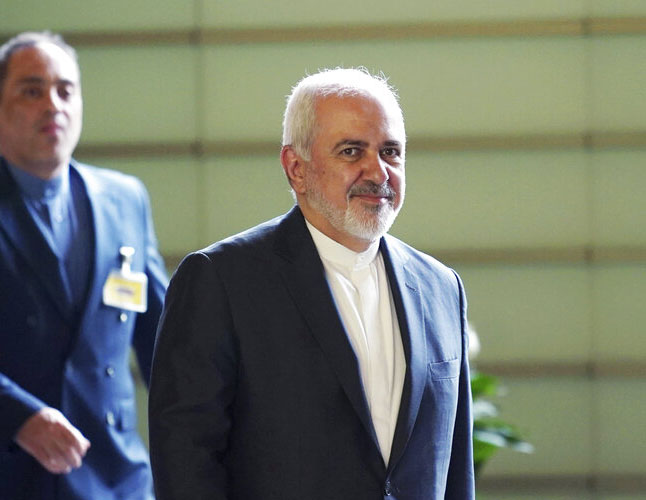Iran's foreign minister on Thursday slammed escalating US sanctions imposed on Tehran by the Trump administration as 'unacceptable,' even as he insisted that his country is committed to an international nuclear deal that has steadily unraveled amid rising tensions in the Mideast.
Recent days have seen allegations of sabotage attacks targeting oil tankers off the coast of the United Arab Emirates, a drone attack on a Saudi oil pipeline claimed by Yemen's Iranian-allied Houthi rebels, and the dispatch of US warships and bombers to the region.
At the root of this appears to be President Donald Trump's decision a year ago to pull the US from Iran's nuclear deal with world powers, embarking on a maximalist sanctions campaign against Tehran.
In response, Iran's supreme leader issued a veiled threat Tuesday, saying it wouldn't be difficult for the Islamic Republic to enrich uranium to weapons-grade levels. He also said that while his country would not negotiate with the United States, Iran is not seeking war.
On Wednesday, the US State Department ordered all nonessential government staff to leave Iraq, and Germany and the Netherlands both suspended their military assistance programs in the country in the latest sign of tensions.
The movement of diplomatic personnel is often done in times of conflict, but what is driving the decisions from the White House remains unclear. Iraq is home to powerful pro-Iranian militias, while also hosting more than 5,000 US troops. The US military's Central Command said its troops were on high alert, without elaborating.
Last week, US officials said they had detected signs of Iranian preparations for potential attacks on US forces and interests in the Middle East, but Washington has not spelled out that threat.
On a visit to Tokyo on Thursday, Iranian Foreign Minister Mohammad Zarif told his Japanese counterpart Taro Kono that his country's response to the US actions — America's pullout from the nuclear deal last year and the imposition of US sanctions — is within the deal and Iran's rights.
Iran recently threatened to resume higher enrichment in 60 days if no new nuclear deal is in place, beyond the level permitted by the current deal between Tehran and world powers. The US pulled out of the deal last year.
Kono expressed concern over the rising tension in the Middle East, and urged Zarif to use restraint and keep implementing the nuclear agreement.
Tehran gave the European Union a July 7 deadline for a new nuclear deal to be in place, otherwise it would start enriching uranium beyond the 3.67% permitted by the current nuclear deal.
Iranian officials have said that they could reach 20% enrichment within four days. Though Iran maintains its nuclear program is for peaceful purposes, scientists say the time needed to reach the 90% threshold for weapons-grade uranium is halved once uranium is enriched to around 20%.










